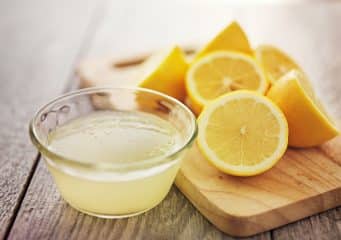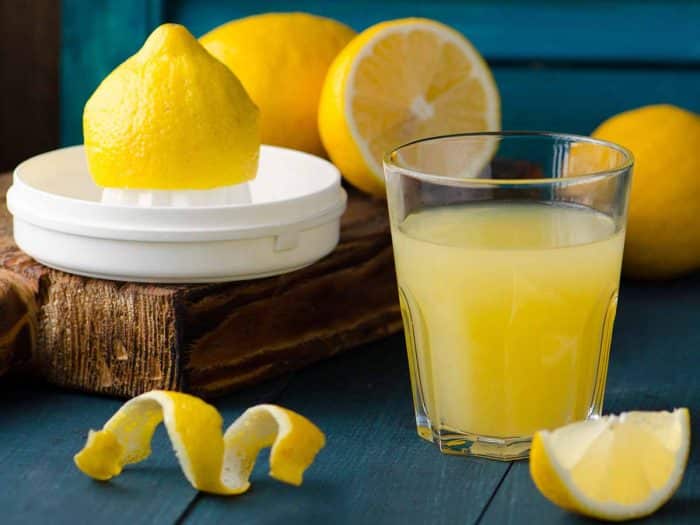- How to Prepare Lemon Juice
- Ingredients:
- Method of preparation:
- Lemon Juice’s Nutritional Value:
- Benefits of Lemon Juice Are:
- Side Effects of Lemon Juice
- Conclusion
Lemon juice is the juice extracted from a lemon by crushing the pulp of the fruit. It is popularly used to make a drink called lemonade through a combination of lemon juice itself, water, and sugar.
Lemon juice has countless uses, from culinary to medicinal. It is a natural cleaner and stain remover. The antibacterial properties of lemons can cure mouth infections like gingivitis and act as a laxative in the digestive system. Research has shown that lemon juice is a great source of Vitamin C. Researchers have also found that vitamin C treatment helps avert atherosclerosis by strengthening artery walls, and is useful in treating infertility and neurological disorders like Alzheimer’s. Do not forget that lemons are diuretic in nature. Therefore you should expect frequent bathroom breaks once you start drinking the juice. Furthermore, you should only use organic lemons and raw honey to get the most of the concoction.
How to Prepare Lemon Juice
Ingredients:
- 1 organic lemon
- Maple syrup or honey for flavor
- 1 glass of water
Method of preparation:
- Cut a lemon into two halves and squeeze its juice removing seeds.
- Pour it into a glass of water and add honey or maple syrup. You can use either warm or cold water as per your preferred choice.
- Give it a nice stir and a refreshing glass of lemon juice is ready!
Lemon Juice’s Nutritional Value:
- Calcium 9g
- Copper 5g
- Folate 9mg
- Iron 6mg
- Magnesium 9g
- Niacin 4g
- Pantothenic Acid 6mg
- Phosphorus 6mg
- Potassium 7g
- Riboflavin 5g
- Thiamin 5g
- Vitamin A 9g
- Vitamin B6 9g
- Vitamin E 9g
- Vitamin C 9g
- Zinc 5mg
 Benefits of Lemon Juice Are:
Benefits of Lemon Juice Are:
- It lowers blood pressure.
- Lemon juice treats respiratory infections.
- It serves as a skin lightener when applied appropriately and not too much.
- Lemon juice also treats acne due to its antimicrobial properties.
- It can also be used to reduce grey hair.
- It promotes digestion as it is highly beneficial to get rid of stomach aches, abdominal cramps, and bloating that occurs during indigestion. It makes the digestion process smoother.
- Lemon juice maintains oral health to get rid of bad breath and bleeding gums. However, ensure you rinse your mouth after drinking one or two glasses because lemon strips the enamel of one's teeth.
- Lemon juice is also great for treating kidney stones by diluting the stones.
- It provides relief from sore throat too.
- It is also ideal for weight loss because it burns fat and boosts one’s metabolic rate.
- Lemon juice also boosts energy levels as it contains zero calories and nourishing properties.
- It strengthens one’s immune system as well.
- Lemon juice works as a detoxifier too by removing toxins and waste materials from one’s body without any side effects.
- It is also used to remove stains from dishes and storage containers.
- It kills bacteria on cutting boards and wooden utensils.
- Lemon juice serves as a natural air freshener too.
- It also removes tough toilet bowl stains.
- It can also be used to make furniture polish.
- It can as well be used to polish pots and pans.
- It also serves as an amazing window washer!
 Side Effects of Lemon Juice
Side Effects of Lemon Juice
Too much of everything is never too good. Hence the side effects of lemon juice start to appear only when you have consumed too much of it. It’s advised not to have more than two to three glasses of diluted lemon juice in a day. The side effects can also depend on your health and that of your teeth and gum.
Here’s a list of possible side effects caused by overdosing on lemon juice:
- It can decay the tooth enamel.
- Too much consumption of lemon juice can cause nausea, vomiting, and an upset stomach.
- It also worsens heartburn and ulcer.
- Lemon juice can also cause sunburns when applied to the skin and taken outside under the sun.
Conclusion
Lemon juice is a delicious drink with lots of health and home benefits no doubt. However, you are still advised to consult with your doctor in cases of serious health problems like blood pressure and refrain from home remedies.

